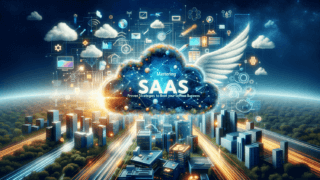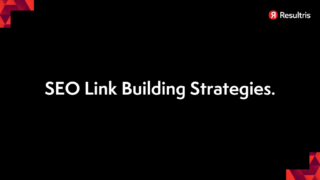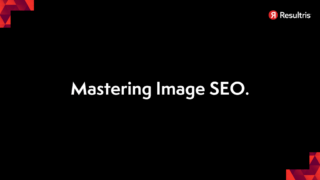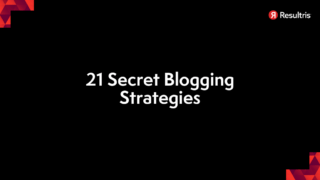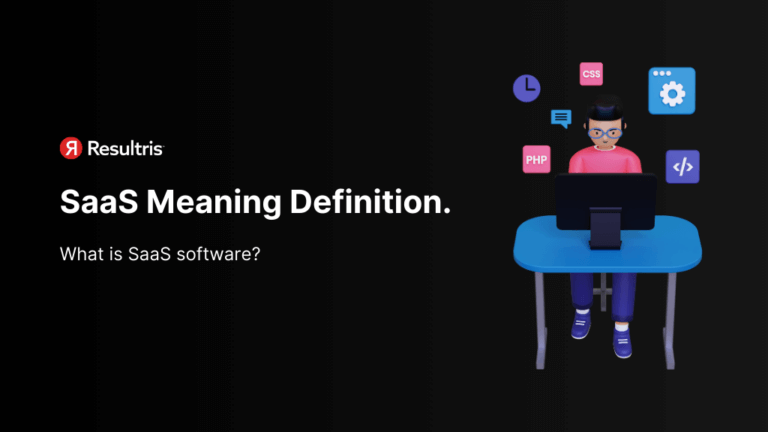
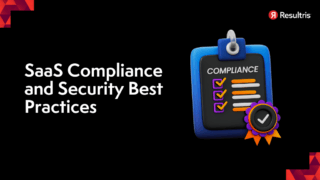
In today’s digital age, the term SaaS is almost impossible not to encounter. But what does SaaS mean? I’ll answer that question in this article.
SaaS, or Software as a Service, is a software licensing model that’s been shaking up the tech world. Instead of buying and installing software on your hardware, with SaaS, you’re essentially renting it on a subscription basis.
Software as a Service, commonly known as SaaS, is a cloud-based service where you access an application via an internet browser instead of downloading software on your desktop PC or business network to run and update. The software application could be anything from office software to unified communications, among other available business apps.
You’re probably more familiar with SaaS than you think. Here are some prevalent SaaS products:
These examples represent a tiny fraction of the booming SaaS market.
As a savvy SaaS marketing consultant, I can tell you one of the defining characteristics of SaaS is its flexibility and scalability. Here are a few noteworthy features:
SaaS marketing agencies can attest to the numerous advantages SaaS offers. They largely stem from its internet delivery model:
Those considering engaging a SaaS marketing agency should note that these advantages translate to increased productivity, improved cash flow, and overall business growth. They’re a testament to SaaS’s potential as a transformative business tool.
Whether you’re a startup looking to launch your first product or an established company aiming to scale, our guides below provide valuable insights and strategies to help you achieve your goals.
Embark on the exciting path of launching a software-as-a-service (SaaS) business. This phase is all about laying the groundwork, understanding the SaaS model, and strategizing for a successful launch. From defining SaaS to selecting the right pricing models and preparing for your product’s debut, this section provides the essential knowledge and tips to kickstart your SaaS journey.
Initial SaaS Strategies:
Launching Your SaaS Product:
Once your SaaS product is off the ground, it’s time to focus on growth. This stage is centered on acquiring new customers, enhancing user engagement, and ensuring customer success. Learn how to generate leads, articulate your value proposition, and onboard customers effectively to build a solid foundation for scaling your business.
Targeting the Right Audience:
SaaS Customer Acquisition:
SaaS Customer Engagement:
Marketing is the engine that drives growth in the SaaS industry. This segment delves into various marketing strategies tailored for SaaS businesses, including content marketing, digital marketing, and sales tactics. Discover how to leverage video marketing, email campaigns, and SEO to boost your online presence and attract more customers.
SaaS Content Marketing:
SaaS Blogging Strategy
SaaS Digital Marketing Strategies:
SaaS Sales and Pricing:
Scaling your SaaS business requires a strategic approach to marketing and sales. This section explores advanced techniques for expanding your reach and increasing revenue. Dive into topics such as marketing funnels, B2B strategies, budgeting for marketing, and the role of a marketing consultant in taking your business to new heights.
The journey of SaaS is fascinating. Sprouting from the initial idea of a shared computer utility in the 1960s, it’s grown by leaps and bounds to become ubiquitous today.
The first significant step occurred in the late 1990s. Companies like Salesforce pioneered delivering enterprise applications via a simple website. Around the same time, early SaaS platforms began emerging. Tightly coupled with the advent of service-oriented architecture (SOA), these platforms paved the way for SaaS as we know it today.
In the 2000s, companies were more open to the idea of ‘renting’ software rather than buying it outright. With the growing virtualization trend, more substantial segments of the database and applications started moving to the cloud. A paradigm shift indeed occurred around 2005 when companies began adopting SaaS at a faster pace. This is when businesses realized the potential perks related to cost, scalability, and accessibility.
Fast forward to today, and we’re witnessing an incredible embrace of SaaS. I’ve seen it grow rapidly, especially in the last decade. There has been a significant upswing in the reliance upon SaaS for operational needs. Google Apps, Salesforce, Slack, Zoom – they’ve all become indispensable.
Marketing this phenomenon smartly and efficiently is crucial. This is where my expertise and that of my fellow SaaS Marketing consultants play a pivotal role. As a SaaS marketing agency, we have the knowledge and tools to help businesses fully tap into SaaS’s potential. We work on the front lines, assisting companies in navigating the dynamic SaaS landscape.
SaaS is now a realm full of creativity, innovation, and constant evolution – be it new features, updated interfaces, or improved data security measures. While we’ve seen significant progress, there is still much more to explore and celebrate in the world of SaaS. With each passing day, it continues to reshape and revolutionize various facets of the business world.
As we dive deeper into the realm of SaaS, let’s compare it with its predecessor: traditional software. Both have their place in the business world yet differ in their usage, cost, and adaptability.
For starters, traditional software revolves around purchasing a license, installing the software on your individual devices and managing it on your own. In contrast, SaaS takes on a rental model, where you subscribe to use the software hosted on a cloud platform. You can access it via any device with an internet connection. IT maintenance and updates are part of the package, usually handled by the provider or a SaaS marketing agency.
There are several reasons many businesses are transitioning from traditional software to SaaS.
Every coin has two sides, and so does SaaS.
The primary downside revolves around data security and privacy. Given that your business data is stored on a third-party server, security measures are predominantly in the provider’s hands. Some businesses have reservations about outsourcing this level of trust.
Moreover, internet dependency can also be a drawback. Without a stable internet connection, you’re essentially stranded. Unexpected outages can hinder productivity.
Lastly, long-term costs can creep up. While SaaS may seem affordable in the short run, repeating subscriptions may amount to more than a one-time licensed software cost over the long haul.
In the ever-evolving business world, it’s about evaluating your unique needs, resources, and priorities. Whether it’s SaaS or traditional software, the right choice depends on what works best for your business model.
Diving into the future of SaaS, the trends are more progressive and innovative. As a seasoned SaaS marketing consultant, I’ve witnessed the evolution of SaaS from its inception until now, and the trajectory seems steeply aimed ahead.
In recent years, Artificial Intelligence (AI) and Machine Learning (ML) have been transforming various industries, and SaaS is not an exception. These powerful technologies are increasingly integrated into SaaS platforms, enhancing their capability to analyze, learn, and adapt. AI algorithms help predict customers’ behavior and simplify decision-making, while ML enables systems to self-learn and improve over time.
In addition, Blockchain technology is another player that’s changing the landscape. It’s fortifying SaaS platforms by optimizing data security, boosting transparency and ensuring smoother transactions. Blockchain-backed SaaS platforms preserve data integrity, reduce fraud and create a more efficient, transparent ecosystem.
As a SaaS marketing consultant, I keep an ear to the ground to be abreast of the newest trends and projections. As per a report from Gartner, the market size of SaaS is set for substantial growth. In 2020, the size was estimated at around $105 billion and it’s projected to swell to approximately $141 billion by 2022. This staggering growth is evidence of the continued preference for SaaS solutions over traditional software, due to its cost-effectiveness, adaptability, and lessened IT overheads.
Today, many businesses consult a SaaS marketing agency to boost customer acquisition and increase market footprint. Agencies specializing in SaaS marketing have a deep understanding of the market trajectory, the competitive landscape, and customer behavior.
Note: Below table shows the projected SaaS market size.
| Year | Projection (in billion $) |
|---|---|
| 2020 | 105 |
| 2022 | 141 |
Navigating the digital landscape can be a minefield with increasing threats to data security and privacy. As a leading SaaS marketing consultant, I’m often asked about the ways SaaS platforms tackle these challenges. I firmly believe that robust security measures and data privacy policies are essential components of any quality SaaS platform.
As a SaaS marketing agency, we need to ensure that businesses understand these security aspects. It’s not about fear-mongering but about building trust among users for services they choose to use. Remember, a breach in SaaS security could lead to catastrophic repercussions not just for the business, but for the clientele as well.
Understanding SaaS security and privacy isn’t just a good-to-know topic. It’s crucial in today’s digital age. As a seasoned SaaS marketing consultant, I’ve seen first-hand the devastating effects of security breaches. But I’ve also witnessed the trust built when users know their data is safe. That’s why robust security measures like data encryption and 2FA are so important. So too is a strong privacy policy that aligns with regulations like GDPR. Remember, when it comes to SaaS, it’s not just about offering a great service. It’s about ensuring your users feel secure and their data is protected.

